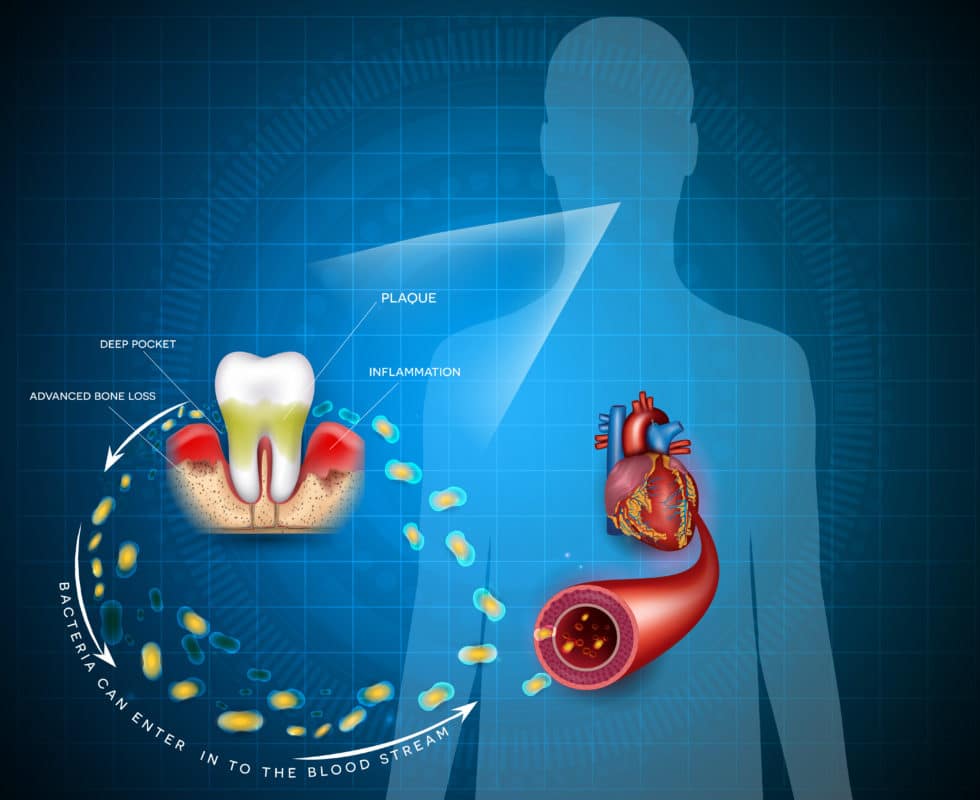Recent studies support a correlation between gum disease and heart problems in patients.
“Periodontitis is caused when bacteria from plaque deposits on the teeth invade tissue and penetrate beneath the gum line; the damaged tissue may become a gateway to the bloodstream and, eventually, the heart. ”
For as long as you can remember, I have told you to brush and floss twice a day and show up for your preventive care visits.
Thanks to recent studies, your incentive should now be greater than ever. If you suffer from periodontitis (gum disease) or are at risk, you should know that research is beginning to show a strong correlation between periodontal disease and heart disease.
Gum disease has not been shown to cause heart disease directly; however, the connection can no longer be ignored. As those who have periodontitis know, the condition is caused when bacteria from plaque deposits on the teeth invade tissue and penetrate beneath the gum line. When the bacteria start to eat away at the tissue surrounding the teeth, the damaged tissue may become a gateway to the bloodstream and, eventually, the heart.
According to doctors who led the research at the University of Minnesota in Minneapolis, a person suffering from the severe periodontal disease has the equivalent of a wound of about eight square inches. Imagine a wound of that size on the skin, and you can imagine the variety of bacteria that could be introduced into the bloodstream. The same thing can happen in the mouths of patients with periodontal disease. The bacteria from the mouth can induce blood clotting, which is pivotal in most heart attacks and strokes. ·One study states that “people with severe periodontal disease had almost twice the risk of developing a cardiac disease.” A second study showed that tooth decay increased the risk of heart disease by one and a half. Further research shows that people who have diabetes are at a greater risk for developing heart disease if they, too, have periodontal disease.
All the news is not bad, however. It is important to remember that we come equipped with a natural bacteriafighting substance that does not always get the respect it deserves – saliva. Saliva carries proteins that stop some bacteria from sticking to teeth and others that cause bacteria to “clump” to make disposal easier. Also, remember that gum disease can be treated with various surgical or non-surgical therapy options and controlled with regular cleaning, dental appointments, and a proper home care routine of brushing and flossing.
The correlation between gum disease and heart disease appears to grow stronger with each scientific study; it is no longer an issue to be taken lightly. If you actively treat and prevent gum disease, you may also be doing your heart a favor. This blog post reiterates the article in the New York Times, ‘Health’ issue recently in laymen’s terms. If you have any questions, please call us at (310) 550-0383.
ARE YOU AT RISK FOR PERIODONTAL DISEASE?
Some causes of periodontal disease can include chewing tobacco, smoking, pregnancy, diabetes, aging, and the grinding and clenching of teeth. Other causes to remember are poor oral hygiene, family history of gum disease, poor nutrition, stress, and certain medications, including oral contraceptives, antidepressants, and heart medications. Although periodontal disease, which needs to be treated, is often present with no pain or discomfort, some symptoms can include bleeding or swollen gums, bad breath (halitosis), and loose teeth.
Are you looking for a cosmetic dentist in Los Angeles? If you want to improve your smile and feel more confident, look no further than Dr. Anthony Mobasser.
With over 30 years of experience, Dr. Mobasser uses advanced techniques and top-tier technologies to correct imperfections in your teeth, giving you a perfect smile.
Dr. Mobasser has amassed a long list of celebrity clientele who know they can count on him to help them put their best face forward. If you want a Hollywood smile, contact the staff at Dr. Mobasser’s Los Angeles office to schedule your first appointment.
To make the process easier, we offer free consultations to begin the journey toward your new smile. Call us today to get started!
Follow us on Facebook for daily updates and oral health tips!

